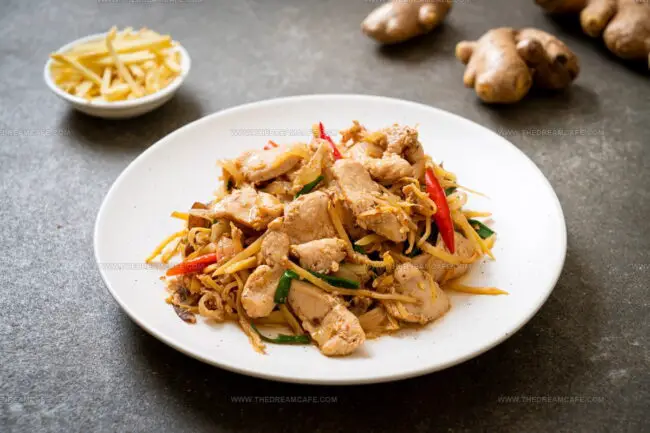11 Fresh Alternatives to Ginger That’ll Save Your Recipe
Ginger adds warmth, zest, and a distinctive spicy-sweet aroma to savory and sweet dishes around the world.
When fresh ginger is out of reach, alternatives such as ground ginger, galangal, or allspice can offer related flavors with varying degrees of intensity.
Some substitutes may alter the dish’s flavor profile slightly, so balancing other spices is essential.
These eleven ginger substitutes make sure your recipes retain their vibrant character despite ingredient swaps.
Knowing which alternative suits your particular dish helps maintain the signature ginger punch.
Whether you’re baking, stir-frying, or brewing tea, these easy alternatives keep your cooking on track.
Explore creative ways to replace ginger without losing flavor or authenticity.
What Are Ginger Flavors?
Ginger has a distinct and versatile flavor profile that’s both warming and refreshing, making it a staple in sweet, savory, and beverage recipes.
At its core, fresh ginger delivers a bright, zesty heat with peppery undertones and a subtle sweetness that develops as it cooks. Its aroma is sharp and citrus-like, thanks to natural compounds such as gingerol, which also give it its signature spicy bite.
When fresh ginger is cooked, its flavor mellows, becoming warmer, slightly sweet, and more earthy, which blends beautifully into soups, curries, marinades, and stir-fries. Dried and ground ginger takes on a warmer, spicier, and more concentrated character, often with a hint of bitterness, making it common in baking, spice blends, and desserts.
What Can Replace Fresh Ginger?
Fresh ginger brings warmth and a bit of spice. If it’s not available, you can still add that lively kick. Look for an option that blends naturally into your recipe.
Dried Ginger
Dried ginger stands as an excellent substitute when fresh ginger isn't available in your kitchen.
Its powerful flavor actually exceeds that of fresh ginger, making it perfect for soups, sauces, and countless baked treats.
The shelf-stable nature of ground ginger allows you to keep it on hand indefinitely, eliminating those frustrating last-minute grocery runs.
Substituting is straightforward - just use 1/4 teaspoon of dried ginger for every tablespoon of fresh called for in recipes.
Many cooks even prefer dried ginger for certain dishes because its concentrated taste distributes more evenly throughout the food.
Frozen Ginger
Frozen ginger offers the same delicious taste and aroma as fresh ginger without all the tedious prep work.
The frozen version also outlasts fresh ginger by weeks, retaining its potent taste throughout soups, stir-fries, cookies, and bread recipes where you'd normally use the fresh root.
For best results, simply substitute equal amounts - one tablespoon of frozen ginger perfectly replaces one tablespoon of fresh in any dish.
Those who enjoy kitchen shortcuts can easily make their own frozen supply by storing excess ginger in an airtight container with a date label, ensuring nothing goes to waste.
Crystallized Ginger
Crystallized ginger offers a delightful substitute for fresh ginger in sweet recipes, especially holiday treats like Christmas cakes where its unique texture adds an extra dimension.
Many bakers appreciate how these sugar-coated ginger pieces last up to two years, thanks to the preservation effects of both sugar and dehydration.
The convenience factor shouldn't be overlooked since this form eliminates the need for peeling and chopping that fresh ginger requires.
Making this ingredient involves soaking small ginger pieces in sugar water before rolling them in additional sugar and allowing them to dry completely.
For the best results when using this substitute, a good rule of thumb is replacing one tablespoon of fresh ginger with three tablespoons of the crystallized version in recipes.
Ginger Paste or Minced Ginger
Ginger paste provides a convenient substitute for fresh ginger in many dishes, saving prep time while still delivering that distinctive spicy-sweet flavor we all love.
This ready-to-use option blends perfectly into stir-fries, curries, marinades, and sauces without the hassle of peeling and chopping.
The paste maintains virtually all the health benefits of fresh ginger, including its anti-inflammatory properties and digestion-friendly compounds.
For best results, simply use equal amounts when swapping paste for fresh ginger in recipes- one tablespoon of paste equals one tablespoon of freshly minced ginger.
Most grocery stores stock ginger paste in tubes or jars near the produce section, making it easy to keep on hand for whenever your recipes call for that perfect ginger kick.
Galangal
Substitution with galangal offers a wonderful alternative to fresh ginger since they share the same Zingiberaceae plant family.
The distinct citrusy, spicy flavor profile with notable pine and pepper notes sets galangal apart from regular ginger, along with its firmer texture that holds up well in cooking.
Savory dishes like curries benefit tremendously from this swap, though galangal can work in desserts too if you're careful with the quantities.
For the best results in your recipes, start by using half the amount when replacing ginger – about 1/2 tablespoon of galangal for each tablespoon of fresh ginger called for.
You can always adjust the amount based on your taste preferences as galangal's unique character might bring an exciting new dimension to your familiar dishes.
Perfect Alternatives for Ground Ginger
Ground ginger is warm, aromatic, and versatile. If it’s missing, your dish doesn’t have to lose flavor. A thoughtful swap can keep that cozy taste intact.
Allspice
Allspice works magic as a ginger substitute because of its earthy, robust flavor derived from dried unripe berries of the Allspice plant.
Many cooks value this versatile spice for its complex taste that holds its own while providing the sweet spiciness similar to ginger, though with a slightly different overall flavor profile.
Swapping ingredients is simple - just use 1 teaspoon of ground allspice for each teaspoon of ground ginger in your recipe.
For recipes calling for fresh ginger, the conversion rate changes a bit - only ½ teaspoon of ground allspice replaces a full tablespoon of fresh ginger.
The wonderful complexity of allspice makes it an excellent addition to your spice cabinet, especially when ginger isn't available.
Cinnamon
Cinnamon is an excellent substitute for ginger in many recipes, with its warming, sweet flavor that can enhance dishes just as effectively.
Most home cooks already have this common spice in their pantry, making it more accessible than ginger when you need a quick replacement.
The substitution ratio is straightforward- just use 1 teaspoon of ground cinnamon for 1 teaspoon of ground ginger, or 1/4 teaspoon of cinnamon for 1 tablespoon of fresh ginger.
Beyond cooking convenience, cinnamon offers impressive health benefits similar to ginger, including reduced blood sugar levels and anti-inflammatory properties.
This spice only requires a small amount to make a big impact, making it both economical and flavorful for your cooking needs.
Mace
Mace is an excellent substitute for ginger in recipes, offering a lighter and more delicate flavor that won't overpower your dishes like its stronger relative might.
Unlike ginger, mace maintains its aroma throughout cooking, ensuring consistent taste regardless of how long it simmers in your pot.
Many cooks appreciate how this spice adds just the right hint of warmth without dominating other ingredients in complex dishes.
The nutritional benefits of mace include essential minerals such as iron and potassium, making it both flavorful and healthy for everyday cooking.
For best results, simply replace one teaspoon of ground ginger with one teaspoon of ground mace, or substitute a tablespoon of fresh ginger with just a quarter teaspoon of mace in any recipe.
Nutmeg
Nutmeg is an excellent substitute for ginger with its similar warm, sweet spiciness that works wonderfully in baking and desserts.
Most home cooks already have this versatile spice sitting in their pantry, making it a convenient replacement when ginger isn't available.
For best results, simply use 1 teaspoon of ground nutmeg to replace 1 teaspoon of ground ginger in any recipe.
Recipes calling for fresh ginger require a different ratio- just ¼ teaspoon of nutmeg can effectively replace a full tablespoon of fresh ginger.
The subtle flavor differences between these two spices can sometimes create even more interesting depth in certain dishes than the original ingredient.
Turmeric
Turmeric is an excellent substitute for ginger with its distinctive earthy flavor and subtle sharpness, though it lacks the same level of spiciness found in ginger.
Most grocery stores carry turmeric in both powder and root form, making it easily accessible when ginger isn't available.
Simply swap one teaspoon of ground ginger with one teaspoon of turmeric in recipes, or replace one tablespoon of fresh ginger with just a quarter teaspoon of turmeric for similar flavor profiles.
The bright yellow color of turmeric adds an attractive visual element to dishes while delivering similar warming notes that complement both savory and sweet recipes.
Ground Cardamom
Ground cardamom is an excellent substitute for ginger in many recipes due to its shared anti-inflammatory and anti-bacterial properties.
This aromatic spice adds a slightly bolder flavor than ginger while maintaining its potency even after cooking, making it stand out among other possible replacements.
From breakfast dishes to delectable desserts, cardamom's versatility allows you to experiment with different culinary creations without missing ginger's distinctive taste.
The wonderfully fragrant aroma that cardamom infuses into any dish creates an inviting sensory experience that Many people find irresistible.
For best results, simply replace one teaspoon of ground ginger with one teaspoon of ground cardamom, or substitute one tablespoon of fresh ginger with just a quarter teaspoon of cardamom in your favorite recipes.
Can I Use Ground Ginger Instead of Fresh Ginger – and In What Ratio?
Yes, you can substitute ground ginger for fresh ginger, but since ground ginger is more concentrated and dried, the amounts differ significantly:
Adjust seasoning gradually, as ground ginger can easily overpower a dish if used excessively.

